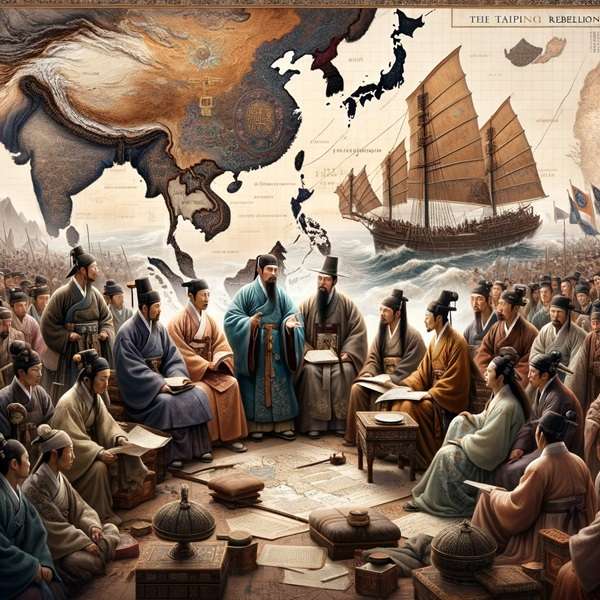
Background: The Taiping Rebellion
Before assessing its impact on Joseon, it’s crucial to understand the Taiping Rebellion’s genesis. Led by Hong Xiuquan, the Taiping Heavenly Kingdom sought to overthrow the Qing Dynasty, influenced by a unique blend of Christian millenarianism and socio-political reform ideas. This massive uprising led to immense social, economic, and political upheaval in China.
Joseon Korea’s Initial Stance
Joseon Korea, a tributary state of the Qing Dynasty, initially maintained a stance of watchful neutrality. The Confucian ideology that dominated Joseon’s governance viewed the rebellion with skepticism, mainly due to its quasi-Christian ideological underpinnings, which were alien to the Confucian principles of the Joseon court.
Economic and Security Impacts
Trade Disruption
The rebellion severely disrupted trade routes and markets, which had indirect but significant consequences for Joseon. As a result, Joseon merchants faced challenges in trading with Chinese counterparts, leading to economic strain.
Refugees and Border Security
The chaos in China led to an influx of refugees into Joseon territory, posing a challenge to border security and resources. Joseon’s government had to balance humanitarian considerations with the practicalities of maintaining order and resources.
Diplomatic and Political Repercussions
Shift in Diplomacy
As the Qing Dynasty’s power waned, Joseon’s diplomatic stance subtly shifted. There was a growing realization within the Joseon court that reliance on a weakening Qing could be diplomatically risky.
Internal Political Debate
The Taiping Rebellion intensified debates within the Joseon court about modernization and opening up to the Western world. The rebellion’s demonstration of the Qing Dynasty’s vulnerability spurred discussions on reform and self-strengthening.
Cultural and Ideological Influence
Confucianism vs. New Ideologies
The Taiping Rebellion, with its unique blend of ideologies, indirectly exposed Joseon’s scholars and elites to new ideas. This exposure did not lead to immediate ideological shifts but sowed seeds of thought that would later contribute to Korea’s own modernization.
Perception of Christianity
Joseon’s perception of Christianity was also affected. The association of the Taiping Rebellion with a heterodox form of Christianity led to increased suspicion and occasional persecution of Christian missionaries and converts in Korea.
Conclusion
The Taiping Rebellion, while primarily a Chinese event, had significant and far-reaching implications for Joseon Korea. It impacted trade, security, diplomacy, politics, and ideological currents. This tumultuous period was a catalyst for change in East Asia and played a role in shaping the course of Korean history, influencing its path towards modernization and opening to the world.
In closing, the Taiping Rebellion‘s impact on Joseon Korea is a vivid reminder of how historical events in one nation can profoundly influence the trajectory of its neighbors, weaving the complex tapestry of East Asian history.
The Russo-Japanese War (1904-1905): A Tug of Power over Korea
Hi, I’m [jeybee]. As a long-time resident of Seoul, I’m passionate about uncovering the authentic, everyday magic of Korea. This blog is my way of sharing my favorite spots, tips, and cultural insights with you, beyond the usual tourist traps.

